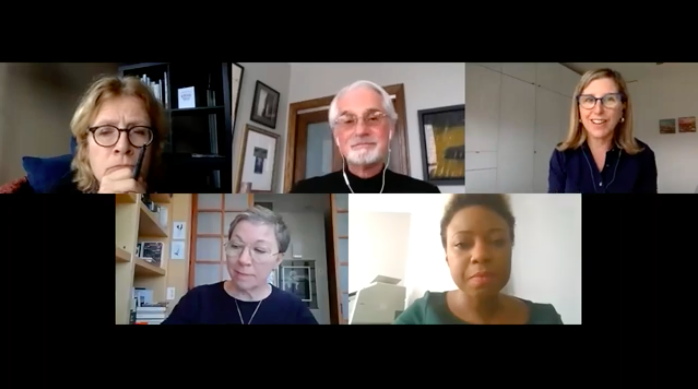
Colette Murphy is the Executive Director of the Atkinson Foundation. She made these opening remarks as a participant in a webinar series called Cities in the Time of COVID 19. This webinar, hosted by the Canadian Urban Institute, explored how cities can build community wealth as economies recover. You can watch a recording of the webinar here.
In this first month of the crisis, we’ve been seeing organizers in lower-income communities do what they do best: amplifying the voices of people most affected by this crisis, and keeping them connected to each other.
Take Parkdale, one of the last remaining affordable neighbourhoods in downtown Toronto. Most of the people who live in South Parkdale are renters, 35% live in poverty. Main street is home to many small businesses. The community is anchored on both ends by large healthcare facilities.
Parkdale has been through a lot, from the building of the Gardiner Expressway in the 1960s to de-institutionalization in the 1970s to a gentrification push in the 2000s. This has created a high degree of resilience and reserves of social capital. This neighbourhood is surprisingly vibrant in good times and bad. How residents look out for each other and share resources is remarkable.
In recent years, community wealth building activities have been a high priority for organizers at the Parkdale Activity-Recreation Centre. They work with residents, community agencies, and small businesses through the Parkdale People’s Economy Project.
They have an exciting vision for the economic development of their community centered on wellbeing — in contrast to the increasing displacement pressures from the rise of corporate landowners, escalating rents, poor work conditions, and other challenges.
Over 800 residents have been involved in this effort in recent years. Residents who have been historically and persistently excluded are at the centre. They’re focused on building collective power to influence decisions of all kinds — from the creation of a community land trust to affordable housing from existing and new stock.
When COVID-19 arrived, organizers Mercedes Sharpe Zayas and Ana Teresa Portillo were able to pivot to emergency response activities. They had built sufficient community knowledge, networks and trust to move quickly.
The Parkdale Mutual Aid Network was created in March. It’s a network of neighbourhood ‘pods’, organized block by block. Neighbours check in on neighbours – pooling resources to help each other. Providing food hampers, giving small sums of money, and fighting evictions as well as reducing isolation and mental health risks. They use digital tools like Whats App and phone trees to stay connected.
While organizers have put down some of their community wealth building tools to attend to more immediate needs, their vision and core values remain strong. These tools will be useful in the social and economic renewal process after the pandemic.
This crisis has reminded us that strong relationships are the most important asset of all. They are key to community resilience. They make a community wealthy even when resources are scarce.
We’re seeing this kind of social solidarity in other neighbourhoods and cities across Canada. Crises and hardships have always held the potential to build capacity and renew community leadership.
My question is: how do we cultivate this kind of organizing culture in more places during this pandemic?
